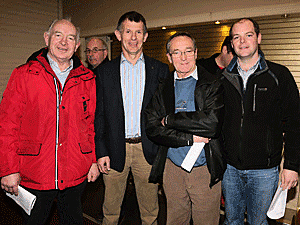THE Spring tillage seminar, jointly organised by Bandon and Barryroe co-ops, attracted a large attendance to the Munster Arms Hotel recently
 BY JOHN SEXTON
BY JOHN SEXTON
THE Spring tillage seminar, jointly organised by Bandon and Barryroe co-ops, attracted a large attendance to the Munster Arms Hotel recently.
The principal speakers included Tim O’Donovan, Teagasc, Kildalton, and Ciaran Collins, Teagasc. Tim O’Donovan, who has close family connections in the Timoleague area, spoke principally on the various cereal varieties, most Spring barley, the crop margins, their susceptibility to various diseases and their potential yield under normal conditions.
The biggest disaster for cereal growers in 2014 was the huge drop in price due to exceptionally-high yields in the major grain growing regions of the world and, while this was compensated to a certain extent by the high yields here at home, its not to be taken for granted. The most popular recommended for 2015 in the line of Spring barley are Propino, KWS irina and Sanette, each of which shows a good resistance to the many diseases and Propino shows the shortest straw, which is a telling factor against lodging in a rainy season.
Of the Spring wheat varieties, the old reliable Sparrow and Trappe are still most favourable, although Quintas and RGT Doubleshot are making quite an impact. For these varieties, milling and baking quality is determined by functional performance tests. While most of the barley nowadays goes for milling (animal feed), there was a time back in the threshing era when Spratt-Archer was king of the brewery barley.
Ciaran Collins spoke on the new Basic Payment Scheme, Greening, Crop Diversification and EFAs (Ecological Focus Areas). He also dwelt on the National Reserve entitlement and the top-up for young farmers and this interested many of the younger generation present. Teagasc also had a paper available on the relative merits and cost of production of the various other tillage crops, such as sugar beet, maize, potatoes, peas, beans and oilseed-rape.
The high input costs for all concerned proved most startling: Fertilisers, herbicides and fungicides eat into the profits and many farmers comparing yields against costs of, say, thirty years ago – a ton of grain was on a par with present-day prices, while inputs were only a fraction of what they are today.
There is a strong feeling amongst farmers that the co-ops should exert more pressure on the compounders to drastically reduce the price of fertilisers.








